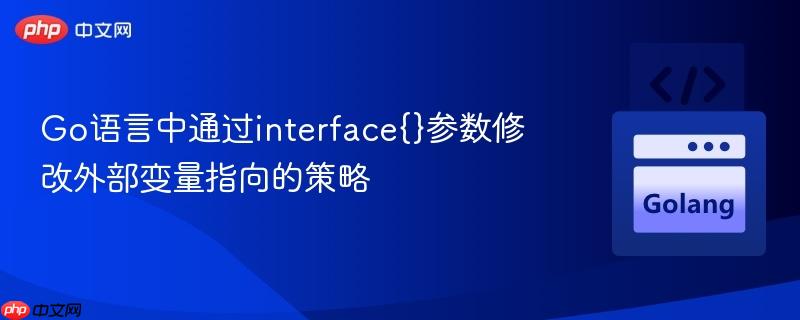
在go语言中,直接通过`interface{}`参数修改外部变量的指向是一个常见挑战,因为接口值是按值传递的。本文将深入探讨两种核心策略:类型断言和反射。通过详细的代码示例和解释,我们将学习如何利用这些机制,使函数能够成功地将新的值赋给外部传入的`interface{}`参数所引用的变量,从而实现预期的修改效果。
在Go语言中,当我们将一个变量作为参数传递给函数时,Go默认采用按值传递。这意味着函数接收的是参数的一个副本,对这个副本的任何修改都不会影响到原始变量。对于interface{}类型也不例外。当一个interface{}变量作为参数传入函数时,函数接收的是该接口值的一个副本。这个接口值内部包含了它所存储的具体类型和具体值。
考虑以下示例代码,它展示了我们试图通过interface{}参数修改外部变量时遇到的问题:
package main
import "fmt"
type Key string
type Item struct {
Key Key
Value string
}
// GetItem 返回一个指向Item结构体的接口
func GetItem(key Key) interface{} {
return &Item{key, "Value from GetFromMemory"}
}
// Get 函数试图通过interface{}参数修改外部item的指向
func Get(key Key, item interface{}) {
// 这里的item是传入参数的副本,对其赋值只会改变副本,不会影响main函数中的原始item
item = GetItem(key)
}
func main() {
var item Item // 声明一个Item类型的变量
Get("Key1", &item) // 传入item变量的地址
// 预期输出 "Result is: [Value from GetFromMemory].",但实际上不会改变
fmt.Printf("Result is: [%s].", item.Value) // 仍会输出空字符串
}在main函数中,我们声明了一个Item类型的变量item,并将其地址&item传递给Get函数。在Get函数内部,item = GetItem(key)这行代码仅仅是重新分配了Get函数局部作用域内item参数副本的底层值,而并没有修改main函数中原始item变量的指向。因此,main函数中的item.Value仍然是其零值(空字符串)。
为了实现通过interface{}参数修改外部变量的目的,我们需要更深入地理解Go的类型系统,并利用类型断言或反射机制。
立即学习“go语言免费学习笔记(深入)”;
当你在编译时已知interface{}参数可能包含的具体类型时,类型断言是一种安全且高效的解决方案。它的核心思想是“解包”interface{},获取其底层具体类型的值,然后进行操作。
为了让Get函数能够修改main函数中的item变量,我们需要传入一个指向item的指针的指针。具体来说:
以下是使用类型断言修改后的代码示例:
package main
import "fmt"
type Key string
type Item struct {
Key Key
Value string
}
func GetItem(key Key) interface{} {
return &Item{key, "Value from GetFromMemory"}
}
// Get 函数通过类型断言修改外部item的指向
func Get(key Key, item interface{}) {
// 使用类型开关检查item的底层类型
switch v := item.(type) {
case **Item: // 如果item的底层类型是**Item(指向*Item的指针)
// GetItem(key)返回interface{},我们需要断言它为*Item类型
// 然后将这个*Item赋值给*v,*v解引用了**Item,指向main函数中的*Item变量
*v = GetItem(key).(*Item)
default:
// 处理其他未知类型,或者抛出错误
fmt.Printf("Error: Unsupported type %T for item\n", v)
}
}
func main() {
var item *Item // 将item声明为*Item类型,与GetItem的返回值保持一致
Get("Key1", &item) // 传入item的地址,此时item的类型是**Item
// 这将打印 "Result is: [Value from GetFromMemory]."
if item != nil {
fmt.Printf("Result is: [%s].", item.Value)
} else {
fmt.Println("Item is nil.")
}
}代码解析:
注意事项:
// 示例:安全的类型断言
if v, ok := item.(**Item); ok {
*v = GetItem(key).(*Item)
} else {
fmt.Printf("Error: item is not **Item, but %T\n", item)
}当你在编译时无法确定interface{}参数可能包含的具体类型,或者需要处理更复杂的动态类型操作时,反射提供了一种强大的机制。反射允许程序在运行时检查和修改变量的类型和值。
使用反射来修改interface{}参数所指向的外部变量,主要涉及reflect.ValueOf和reflect.Value类型的方法。
package main
import (
"fmt"
"reflect"
)
type Key string
type Item struct {
Key Key
Value string
}
func GetItem(key Key) interface{} {
return &Item{key, "Value from GetFromMemory"}
}
// Get 函数通过反射修改外部item的指向
func Get(key Key, item interface{}) {
// 1. 获取item参数的反射值
itemValue := reflect.ValueOf(item)
// 2. 检查itemValue是否为指针,并且是否可修改
// 如果itemValue不是指针,或者不是可设置的(例如,它是一个非导出字段或直接值),则不能修改
if itemValue.Kind() != reflect.Ptr || itemValue.IsNil() {
fmt.Println("Error: item must be a non-nil pointer")
return
}
// 3. 获取指针指向的元素(即实际要修改的变量)
// itemValue现在是**Item的反射值,Elem()会解引用一次,得到*Item的反射值
targetElem := itemValue.Elem()
// 4. 再次检查targetElem是否可设置
if !targetElem.CanSet() {
fmt.Println("Error: target element is not settable")
return
}
// 5. 获取GetItem(key)的返回值,并将其包装为反射值
newItemValue := reflect.ValueOf(GetItem(key))
// 6. 检查类型是否匹配
// 如果newItemValue的类型与targetElem的类型不兼容,Set操作会panic
if !newItemValue.Type().AssignableTo(targetElem.Type()) {
fmt.Printf("Error: Cannot assign type %s to %s\n", newItemValue.Type(), targetElem.Type())
return
}
// 7. 使用Set方法将新值赋给目标元素
targetElem.Set(newItemValue)
}
func main() {
var item *Item // 声明一个*Item类型的变量
Get("Key1", &item) // 传入item的地址
// 这将打印 "Result is: [Value from GetFromMemory]."
if item != nil {
fmt.Printf("Result is: [%s].", item.Value)
} else {
fmt.Println("Item is nil.")
}
}代码解析:
注意事项:
在Go语言中,通过interface{}参数修改外部变量的指向,需要理解接口的按值传递特性,并利用指针、类型断言或反射机制。
在大多数实际应用中,如果能够通过类型断言解决问题,通常会优先选择类型断言,因为它更符合Go的“显式优于隐式”的设计哲学,且性能更优。只有在确实需要高度的动态性时,才考虑使用反射。无论选择哪种方法,都应充分理解其工作原理,并做好错误处理和类型检查,以确保代码的健壮性和可靠性。
以上就是Go语言中通过interface{}参数修改外部变量指向的策略的详细内容,更多请关注php中文网其它相关文章!

每个人都需要一台速度更快、更稳定的 PC。随着时间的推移,垃圾文件、旧注册表数据和不必要的后台进程会占用资源并降低性能。幸运的是,许多工具可以让 Windows 保持平稳运行。

Copyright 2014-2025 https://www.php.cn/ All Rights Reserved | php.cn | 湘ICP备2023035733号